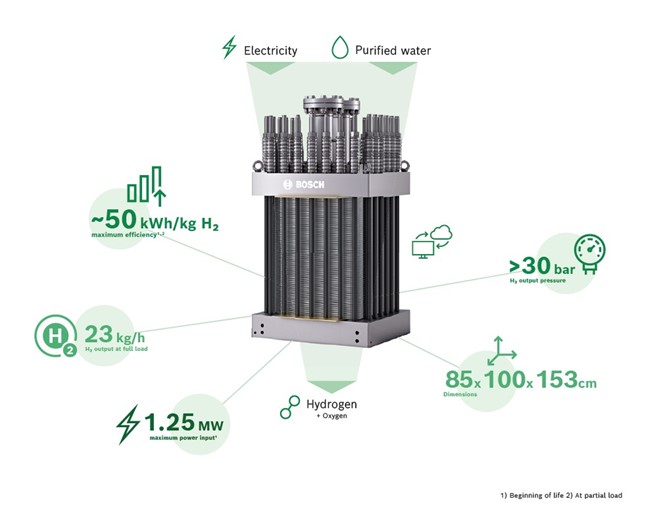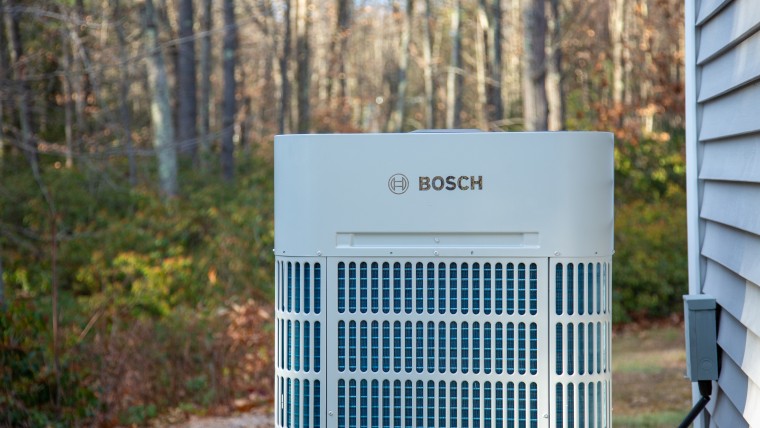In this edition of our Climate Champions series, we speak with Rafael Antiquera, Growth and Innovation Director at Bosch Canada. Founded in Germany, Bosch is a global leader in mobility solutions, industrial technology, consumer goods and, energy and building technologies. In this conversation, Rafael shares insights into Bosch's sustainability goals and efforts to create a cleaner future.
With its more than 400 locations worldwide, the Bosch Group has been carbon neutral overall (scopes 1 & 2 of the Greenhouse Gas Protocol Corporate Accounting and Reporting Standard) since 2020. This is achieved with four levers: improving energy efficiency, generating energy from renewable sources, purchasing green electricity, and offsetting residual CO₂ emissions with carbon credits.
As one of the first large industrial organizations to reach this milestone globally, Bosch continues to pursue sustainability measures as an integral part of its corporate culture, and has set ambitious future targets, including a reduction of scope 3 CO₂ emissions by 15 percent in absolute terms by 2030 (baseline year 2018), increasing renewable energy generation to 400 gigawatt hours, and covering 100% of its electricity requirements with green electricity by 2030, according to the company's 2023 Sustainability Report.
Hydrogen technology is a key pillar of Bosch’s sustainability strategy. "Between 2021 and 2026, Bosch is investing nearly $2.6 bn in H₂ technologies, in areas such as water processing, compression, storage and use of hydrogen leveraging products like PEM (proton exchange membrane) fuel cells and electrolyzer stacks”, Rafael notes. These technologies are crucial in transitioning from fossil fuels to hydrogen, allowing buildings and industries to significantly reduce emissions. Hydrogen is especially vital for decarbonizing sectors like heavy industry and transportation, which are difficult to fully electrify.

As part of its H₂ strategy, Bosch is bringing to the market PEM electrolyzer stacks — devices that split water into hydrogen and oxygen—to produce green hydrogen. These stacks use electricity, ideally from renewable sources, to generate hydrogen, a clean energy alternative. "Our go-to-market strategy with the electrolyzer stacks requires strong partnerships with local integrators to bring these solutions to the market. We're working with Canadian companies to develop these systems using our stacks, and with project developers in Ontario and across Canada to potentially deploy these systems in future green projects, helping reduce emissions and shift to cleaner energy sources," Rafael says, positioning Canada as a key player in Bosch’s global hydrogen efforts and the broader clean energy transition.
"Hydrogen technology is a key pillar of Bosch’s sustainability strategy, and Canada plays a crucial role in our global efforts. By collaborating with local partners, we're bringing innovative solutions like PEM electrolyzer stacks to market, helping accelerate the transition to cleaner energy sources."
— Rafael Antiquera, Growth and Innovation Director at Bosch Canada
While hydrogen initiatives are central to Bosch's vision, the company also emphasizes reducing energy consumption through its range of energy-efficient consumer products. "We continuously strive to develop technologies that consume less energy and reduce the impact on emissions -- for example our refrigerators (awarded as the 2024 ENERGY STAR® partner of the year by the U.S. Department of Energy) and our highly efficient heat pumps," Rafael explains.
These products, from home appliances to industrial equipment, are designed to reduce energy use while maintaining high performance, helping to reduce emissions, particularly in energy-intensive urban areas like the Toronto region.
In cities like Toronto, where sustainability goals are becoming increasingly ambitious, Bosch’s energy-efficient solutions play a vital role in helping both consumers and businesses reduce energy consumption and costs. Key products such as ENERGY STAR® certified refrigerators, energy-efficient dishwashers, smart washing machines, and energy-saving induction ranges and cooktops exemplify Bosch’s commitment to innovation and environmental responsibility. Torontonians can explore these home appliances solutions at the Bosch showroom 'Luxe Appliance Studio' located at 334 King Street East.
 Images: Bosch’s showroom ‘Luxe Appliance Studio’ in Toronto.
Images: Bosch’s showroom ‘Luxe Appliance Studio’ in Toronto.Bosch’s heating and cooling systems contribute significantly to regional and national emissions reduction targets, reinforcing Bosch’s position as a key player in driving everyday emissions reductions.
Earlier this year, Bosch introduced its first air-to-air cold climate heat pump, engineered specifically for high-efficiency heating in extremely cold regions. This innovative system enables consumers to transition away from fossil fuel-based heating, delivering 100% heating capacity down to -15°C and continuing to operate efficiently even at -25°C. Additionally, consumers in Canada can benefit from various tax credits and rebates, making these energy-efficient upgrades even more accessible.
As a global company driving sustainable technologies, Bosch views Canada as one of the key players in its hydrogen strategy. With abundant renewable resources and ambitious climate policies, Canada is ideally positioned to align with Bosch’s global sustainability goals. "We see North America, including Canada, as a key region for deploying these new technologies," says Rafael. "Canada is currently one of the top 10 producers of hydrogen in the world, and we believe the country offers immense potential to continue to lead in this sector as the world transitions to low carbon intensity hydrogen. Bosch technologies can help accelerate this transition."

Image: Bosch's cold climate heat pump IDS Ultra
Rafael emphasizes the potential for collaboration between Germany and Canada, where Canadian companies can leverage hydrogen technologies developed by Bosch, like the PEM electrolyzer stacks. This approach not only supports clean energy production in Canada but also contributes to worldwide efforts to reduce emissions, as the country plans to export green hydrogen to other countries, including Germany.
By partnering with Canadian stakeholders and maximizing the country’s resources, Bosch is poised to drive both regional and global sustainability efforts, supporting the positioning of Canada as a leader in the emerging hydrogen economy.
The Climate Champions series spotlights our members who are leading experts in cleantech and climate innovation. As the global cleantech economy booms, the Toronto region has the potential to lead—driven by the organizations taking bold steps to green their operations and pioneer new technologies. This series celebrates the trailblazers propelling our region towards global climate leadership and a net-zero future by 2040.

